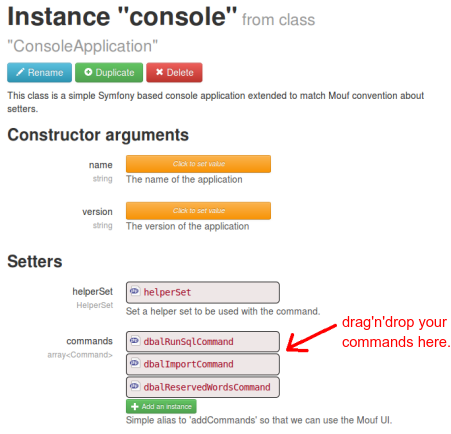mouf / utils.console
A console for the Mouf PHP framework.
Installs: 111 196
Dependents: 5
Suggesters: 0
Security: 0
Stars: 0
Watchers: 13
Forks: 3
Open Issues: 0
pkg:composer/mouf/utils.console
Requires
- php: ^8.0
- symfony/console: ^2 | ^3 | ^4 | ^5 | ^6
- symfony/event-dispatcher: ^2 | ^3 | ^4 | ^5 | ^6
README
Console for Mouf PHP framework
This is a simple Symfony 2 based console for the Mouf PHP framework.
Why?
Mouf is a graphical framework, so most of the development is done in the UI. However, it can sometimes be useful to have a command line interface, to use in deploy scripts or on remote servers... This package provides this command-line.
How does it work?
Simply include this package in your composer.json requirements:
{
"require": {
"mouf/utils.console": "~1.0"
}
}
The command line will be accessible from vendor/bin/mouf_console
Adding your own command
In order to add a new command to the list of available commands,
you must create a new class extending the Command class.
Then, you should create an instance of the class in Mouf user interface.
Finally, the console application is represented by the console instance in Mouf.
Edit this instance, and drag'n'drop your command in the list of known commands:
Package developers
Most of what you need to know is detailed in Symfony's doc.
In order to create a new command and register it automatically when you package is installed, you should:
- create an install script for your package
- create an instance of the command in this installation script
- register this command using
ConsoleUtils::registerCommand($command)
Here is a sample script you could put in your install script:
use Mouf\Actions\InstallUtils; use Mouf\Console\ConsoleUtils; use Mouf\MoufManager; ... // Let's create an instance of "ConsoleUtils" $consoleUtils = new ConsoleUtils($moufManager); // We declare our instance of the Symfony command as a Mouf instance $dbalRunSqlCommand = InstallUtils::getOrCreateInstance('dbalRunSqlCommand', 'Doctrine\\DBAL\\Tools\\Console\\Command\\RunSqlCommand', $moufManager); // We register that instance descriptor using "ConsoleUtils" $consoleUtils->registerCommand($dbalRunSqlCommand);
Notice how $dbalRunSqlCommand is a descriptor of the 'dbalRunSqlCommand' instance and not the instance itself.
If you need a particular "helperSet", you can register it using ConsoleUtils::registerHelperSet($helperSet)

